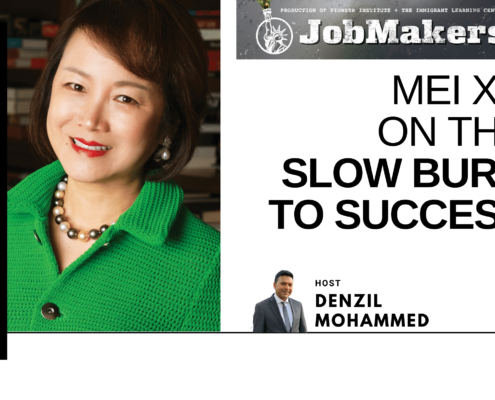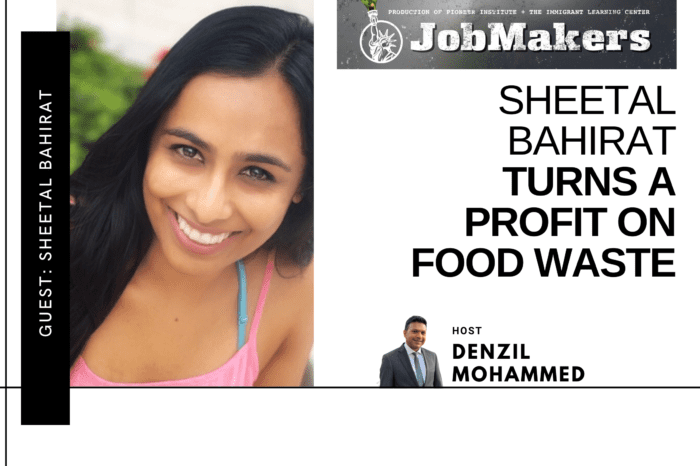Sheetal Bahirat Turns a Profit on Food Waste
/in Economic Opportunity, Featured, JobMakers /by Editorial StaffThis week on JobMakers, host Denzil Mohammed talks with Sheetal Bahirat, founder and CEO of Hidden Gems Beverage Company, maker of Reveal Avocado Seed Brew, and immigrant from India. Food waste is an understudied and underutilized component of our daily lives with huge implications for our bodies and the planet – it is the number one contributor to climate change. Our featured immigrant entrepreneur, Sheetal, merged science with advocacy and created Hidden Gems Beverage Company to act on food waste in the most fruitful way possible, starting with one of America’s favorite fruits, the avocado. You’ll learn about her story and success, in today’s episode of Jobmakers.
Guest:
 Sheetal Bahirat is an experienced entrepreneur with a demonstrated history in building startups, and a passion for beverages and sustainability. She is Founder and CEO of Hidden Gems Beverage Company, maker of Reveal Avocado Seed Brew, a delicious antioxidant rich beverage from avocado seeds. She has managed all aspects of the business from conceptualization, to R&D, product development, sales, fundraising and team building. Sheetal was born in India, but spent part of her childhood in California, and graduated from Drexel University, where she was a Research Assistant in the school’s Culinary Arts Graduate Program.
Sheetal Bahirat is an experienced entrepreneur with a demonstrated history in building startups, and a passion for beverages and sustainability. She is Founder and CEO of Hidden Gems Beverage Company, maker of Reveal Avocado Seed Brew, a delicious antioxidant rich beverage from avocado seeds. She has managed all aspects of the business from conceptualization, to R&D, product development, sales, fundraising and team building. Sheetal was born in India, but spent part of her childhood in California, and graduated from Drexel University, where she was a Research Assistant in the school’s Culinary Arts Graduate Program.
Get new episodes of JobMakers in your inbox!
Read a Transcript of This Episode
Please excuse typos.
Denzil Mohammed:
I’m Denzil Mohammed and welcome back to Jobmakers.
Denzil Mohammed:
Have you ever given a thought to the food you waste for a given meal on a given day or over a lifetime? Ever thought about how much food waste is generated even before a meal reaches you? Pulp skin seed hide organs. According to today’s immigrant job maker, food waste is the number one contributor to climate change. So much so that if food waste were a country, she says it would be the third most polluting country in the world. For Sheetal Bahirat, founder and CEO of Hidden Gems Beverage Company, maker of Reveal Avocado, Seed Brew, and Immigrant from India, Food Waste is an understudied and underutilized component of our daily lives with huge implications for our bodies and the planet. So she merged Science with advocacy and created hidden Gems to learn about and act on food waste in the most fruitful way possible, starting with one of America’s favorite fruits, the avocado. Sheetal has lived in many different places, but finds home and the entrepreneurial ecosystem she needs in the United States. It hasn’t all been smooth sailing. However, as an immigrant woman minority, she faces hurdles, others may not. As you learn in this week’s Jobmakers
Denzil Mohammed:
Sheetal Bahirat, founder and CEO of Hidden Gems Beverage Company, maker of Reveal Avocado Seed Brew. Welcome to the Jobmakers podcast. How are you?
Sheetal Bahirat:
I’m good. Thank you for having me. I’m really excited to talk with you today.
Denzil Mohammed:
I’m excited to talk to you because you’ve done so much already. So tell us who exactly is Sheetal Bahirat
Sheetal Bahirat:
WellI would say in my current roleI’m the founder and CEO of Hidden Gems but other than that I’m a food waste researcher and a food scientist and kind of landed up here in this space in a very weird way. I’ve lived many lives, I guess I would say. I was a personal stylist at one point in my career. I was a chief stylist at a personal styling company that was like an onlinepersonal styling company. I ran a cold press juice company before. This is all before I went to do my masters in the US and did my masters in culinary arts and science. And that’s kind of how I ended up being in the role that I am right now.
Denzil Mohammed:
Well, what drove you to a mission-based kind of career?
Sheetal Bahirat:
So I fell in love with food. And then from food, I started a cold press juice companywhere I discovered how much food I was wasting. Every week, every day it was just like buckets and buckets of like leftover pulp that was just waste. And that didn’t sit very well with me. I am originally from India and like we don’t throw things away, so obviously I was trying to figure out how I can use all of those, all of the things that were being wasted every day. Cause they still tasted really good. It was a pineapple two seconds ago, and now it comes out of the other end of a juice store and it’s no longer viable. Like, it didn’t make any sense to me. So that’s how I ended up at Drexel University to do my master’s in culinary arts and science with like Dr. Jonathan Deutch, who’s like the world’s best food waste researcher to like, learn how I could make use of things that were wasted which naturally translated, I guess into hidden gems. And what I do today,
Denzil Mohammed:
You bring up two points that, that people in the US all around the world take take for granted, which is one how powerful food is in our lives. You know, we crave the tastiest food, it gives us so much satisfaction. And in the US we are unique because we have the entire spectrum of, of, of cuisines to choose from every day even in our fast food, Taco Bell, Chipotle, you know? And we really do take that for granted in the US that we have access to every possible kind of cuisine as a result of immigration. And I’m an immigrant talking to you, an immigrant in the US about food and the things that we love. And the other thing you, you brought up, I read that you once said Food waste is the number one contributor to climate change, and if it were a country, it would be the third most polluting country in the world. But talk us through the genesis of this particular business and how you got to reveal avocado seed brew. How did it start and what took place to get you where you are now?
Sheetal Bahirat:
Yeah, soI was just doing my master’s like a regular student. I was, you know, a food waste researcher. I was researching with my professor. We were writing actually curriculums for different restaurants and stuff for how to utilize all of the food that they were, you know, like a full use kitchen and like, don’t throw anything away. So basically preaching to the choir, <laugh>. And then during one of my classes I had to make guacamole for my class, so I did. And I had like peeled and pitted an entire case of avocados. And you know, I mean, I knew at that time I don’t think I’d ever really eaten that much guacamole before. And this is like my first time like making guacamole and ended up with like the smallest goal of pulp and guacamole and like the biggest bowl of seeds and peels.
Sheetal Bahirat:
And like, I was about to throw that away. And then, you know, something in my head was like, Wait a second. You keep talking to everyone, you’re writing freaking curriculums about how not to waste food and you’re just gonna throw this away without a thought. And then when I started to do the research, honestly, my mind was blown by the opportunity and the potential. So like avocados are one of America’s favorite fruit, I would say like <laugh> and we throw away approximately 15 million pounds of avocado seeds into the landfill every week in the us. And that’s just like a mind blowing number. So there was like a big problem here, in my opinion, of like, Oh wow, okay, there’s, here’s a fruit that we’re eating so much of and that number is expected to grow. Like everyone knows that they’re healthy.
Sheetal Bahirat:
Everyone’s trying to eat more avocados. And on the other side, as we eat more avocados, we have more waste. Like, so with avocados there was just like this big gaping like problem and issue. And when I started to do some of the preliminary research about what we could do with avocado seeds my mind was like blown with just the the potential and the opportunity. So with avocado seeds, like right, right now we use it to make a functional beverage because there’s a ton of antioxidants in an avocado seed. So we’re throwing away 95% of the antioxidants in an avocado. So the avocado seed could have been used to like extract the antioxidants to make a drink. Those antioxidants can also be like a dietary supplement. Those antioxidants can also be used to preserve food. And you can actually create an activated charcoal out of avocado seeds that will extract lead and heavy metals out of water so you can purify water with avocado seeds. It’s being researchedfor pharmaceutical uses specifically to treat diabetes and high blood pressure. So it’s just like there was this universe that was just hidden behind something that we just without a thought throw away 15 million pounds a week.
Denzil Mohammed:
What has been the reception to your product and your mission? I know that it’s, it’s tasty. It started out as a tea and now it’s a cold drink. But also your mission. What has been the reception?
Sheetal Bahirat:
I mean, I think people are really excited about what we’re trying to build here. And I think as we were getting more into like building the company and deciding like, you knowwe were raising money and then kind of realizing that like, oh, this is money and like that’s put into our hands so we can use this responsibly. Like, you know we can spend it in a way that we would feel really good about spending it and, you knowso I think all of those things like connect with a lot of our customers. And especially at the moment, like we don’t have that many customers that know about our product, but we do have like quite a few retailers and like distributors that are very excited about the mission that we have. So that way, and even investors like that response has been great.
Denzil Mohammed:
You mentioned that this is not the first company you started, you started your first company in your first year of college. You started the cold press juice company with your mother out of your house. But what was the, and I think you alluded to this earlier, but what was the common thread between all these businesses and perhaps future businesses?
Sheetal Bahirat:
I think it was just like there was there was an opportunity that was in front of me and at whichever time it was, I knew that I had the ability and also I felt the responsibility to make that happen. And I think that was gonna be like the easiest way. So like in college, the first company that I did, it was like with a bunch of friends. We wanted to basically do like experiential learning programs for other students, which I felt like when I was growing up in California, there was a lot of that in my school and I loved that. I felt like that was the favorite part of my education. And I felt like when I moved back to India, I didn’t see a lot of that happening in the schools that I was in. So it was just like, I felt like, okay, I had experienced it, I knew what it was, like I knew that I could put these together.
Sheetal Bahirat:
And I knew that I could have other peers and other like students that were younger than me to kind of experience that. So it kind of was like a need and also like, oh yeah, I can do that. Similarly with with Big Blender, it was just like in the Indian market at the time, there weren’t really any healthy drinks on the market. And for me it was like I wanted to drink a healthy shot of vitamins every morning, and I wanted it to be freshly pressed. I wanted it to be, you know, made that morning. And I think a lot of my customers also wanted that. And I mean, I used to make juices for myself anyway, so I had a bunch of recipes already. So started the company from there. And then even with this, it was just like, I’m a food scientist.
Sheetal Bahirat:
There’s a ton of avocado seeds that are going to waste. I have the ability and the knowledge to, to figure out how to do this. Like even if other people didn’t know that, like I have every resource at my fingertips to do the research and figure it out. I have access to the best minds in the world that can help me figure it out. So that’s kind of really how I’ve always approached things is like, okay, I mean, I’m in a position of power where I can do something. So I wanted to, I guess.
Denzil Mohammed:
So clearly you didn’t just happen onto entrepreneurship, it’s something that you consciously wanted to do and studied for and prepared yourself. But you know, you, you talked about how many schools you went to, 10 different schools before you even entered college moving around a lot. Do you think being an immigrant or, you know, having moved around a lot, seeing different things, having different cultural experiences, did that play any sort of role in your being an entrepreneur?
Sheetal Bahirat:
I think so. I think every time that I moved, I was put in a place where, where obviously things are different and everything is done differently. I definitely did learn a lot from and loved a lot of the parts of everything that I learned. But there were always parts that I felt like I left behind and were missing. And I felt like it would be so nice for my current community or the people that are closest to me to experience. And I think bringing those experiences to the people that are around me, whether it was my friends, my classmates, my community was like a part of what made me want to even try to start something. And I don’t know if I like, especially when it came to like in college, like I don’t even think I was thinking of it like, Oh, this is gonna be like a huge company.
Sheetal Bahirat:
This was like, Oh, this is something that I can do. And honestly, it was <laugh>, it was kind of a big failure because we priced our product really, really low. We pitched to the school that we were gonna train four days a week, and we pitched it for 10,000 Indian rupees at the time. And then by the time we bought all of the materials before even the first training session, we ran out of money. We had no money left, we didn’t know what we were doing. And then the rest of the year because we had the contract, we kind of had to go in and our parents had to bail us out by paying for fuel. And we couldn’t, you know, hire any trainers. We had to go on rotation and everyone had to skip school, like, you know, once every couple of weeks to do the training sessions. So, I mean, it was a good learning experience, but I don’t know if at the beginning when I started out, I knew that I wanted to do that. I just knew that I had an idea that I felt like needed to exist.
Denzil Mohammed:
So tell us about being a woman, a minority, and an immigrant, and yet being able to successfully start a business in the US Now let’s not put rose tinted glasses on that, you know, it’s, it’s, it’s a seamless process, but what has the spirit experience of entrepreneurship been like for you in the US and perhaps what, what makes the US conducive to entrepreneurship? Even from people who just move here, you know, a year ago?
Sheetal Bahirat:
Yeah. I think there’s, there’s a lot of good things about moving to the us. And especially for me, like going to university, I got to meet so many people and basically like, it was like a network of, of people that really are passionate about the things that I, that I care about as well. So it was like a inbuilt community. And I think also with like with investors, I feel like, and even just like regular people, I feel like there’s the culture of investing and like paying it forward, which obviously is like, well, the only way that my company could even exist is because of angel investors. I mean, I didn’t have any resources when I moved to the US to, to brute strap or to put in, you know, any kind of money into my company. And everything came either through like grants or awards or in angel investors or accelerator programs.
Sheetal Bahirat:
So like that was amazing, which I don’t know if had I been in India, I would’ve had the same kind of opportunities. But being an immigrant and especially a minority woman, it’s definitely more difficult. I feel like than I thought it was gonna be. I feel like there’s this sometimes I mean, I just have one anecdote for you actually, which is just like it was a pitch competition and I think I was the only minority woman that was pitching that day, and I think I was like the eighth company to go on stage and then we’re like a hundred people in the audience. And I did my whole pitch. I like, you know, explained my company, did everything like, very similar to what all of the other companies did. And like there was someone in the audience that basically asked me like, What makes you think that you’re qualified to run this company?
Sheetal Bahirat:
And I mean, here I am standing in front of a hundred people being asked a question that literally no one else got asked. But I guess it also made me be like, Hey, listen, like I’m a food scientist, I’m an entrepreneur. I’ve done this a thousand times. I have literally every ability that I need to make this happen. But I do get put into situations like that sometimes, and it’s not the nicest situation. Like I wouldn’t want to relive that, and I wouldn’t want anyone else to have to go through that. So I mean, there are times when I feel like I get asked specific questions or I get put into positions because I look different, or I’m from a different country. And it’s kind of like easier, I guess, to take advantage of someone who may not have the network. So I have to be a little bit more careful when it comes to that. But luckily I think I’ve surrounded myself with really great people that don’t do that, so That’s fantastic.
Denzil Mohammed:
I’m so sorry you had that experience, but I’ve, I’ve heard that multiple times on this podcast. But yeah, I mean, the United States is where entrepreneurship happens. It has a culture of entrepreneurship, but it is not, it’s, it’s not even for everyone. Depending on your background, how you look or your accent. And we, we do need to make that point really clear. And you talked about this culture of investing and paying it forward just as, as an aside on LinkedIn, our common LinkedIn contact is Desh Deshpande and talk about someone who has a culture of investing and paying it forward. Desh is, you know, the king of that and he’s also from India.
Sheetal Bahirat:
Yes, I know.
Denzil Mohammed:
What is next for you? Apart from, you know, the avocado seeds, what’s next for Sheetal Bahirat?
Sheetal Bahirat:
Well, I think that Hidden Gems has so much more than just a beverage. Like I was saying, there’s all of these other opportunities that I’m very excited to explore. So apart from growing the beverage side of the business, I think there’s a lot of r and d to be done. There’s a reverse distribution system to be built. There’s a supply chain to be a food supply chain to be made more environmentally friendly. I feel like there’s also the opportunity to, through like like marketing to, but to market with, like by spending money with people, like actual people rather than spend giving money to Facebook. Like I don’t believe in that. I would rather give my money to the people that actually make impact in the community and to help us like drive community engagement and like market that way. So there’s so much that I wanna build here that I don’t know that I’m ready to think about what’s next. Like, apart from Hidden Gems, I think I have a lot of work to do here before I move to another idea. But I, I see that happening. It’s happening faster than I thought sometimes and sometimes slower than I thought. So I kind of have to take it by day.
Denzil Mohammed:
Yeah, I perfectly understand. I mean, this is such an understudied field and there’s so much that we can find out with the food that we, that we waste and how we can play a role in sustaining our climate and our planet as well as sustaining our bodies and our health. Sheetal Bahirat, thank you so much for joining us on the Jobmakers podcast. It was really a delight talking to you.
Sheetal Bahirat:
Thank you for having me. I’m so honored that you chose to talk with me.
Denzil Mohammed:
Jobmakers is a weekly podcast about immigrant entrepreneurship and contribution produced by Pioneer Institute of think tank in Boston and the Immigrant Learning Center in Malden, Massachusetts, a not-for-profit that gives immigrants a voice. Thanks for joining us for this week’s inspiring story of one incredible immigrant entrepreneur. If you know our outstanding immigrant business owner or innovator, we should talk to email Denzil, that’s d e n z i l @ jobmakerspodcast.org. I see you next Thursday, noon for another jobmakers.
Recent Episodes:
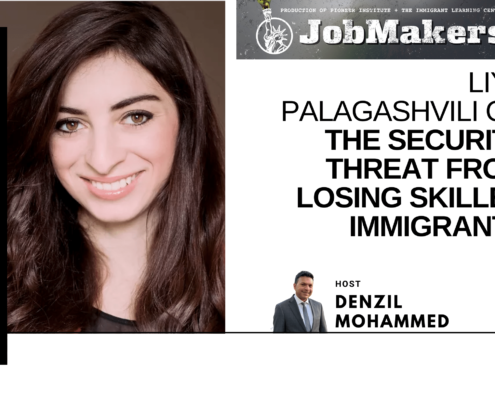
Liya Palagashvili on the Security Threat from Losing Skilled Immigrants
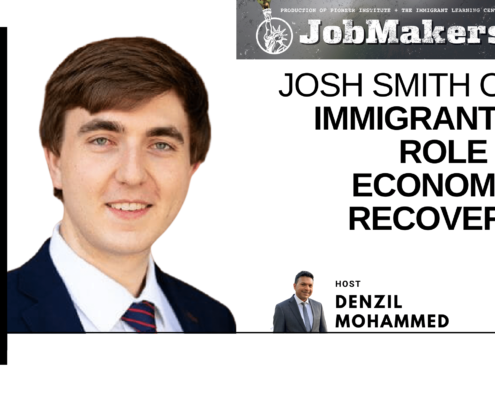
Josh Smith on Immigrants’ Role in Economic Recovery
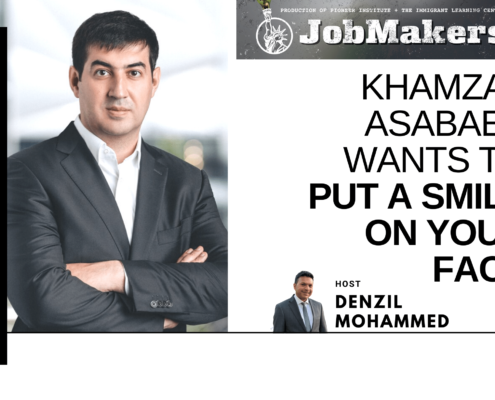
Khamzat Asabaev Wants to Put a Smile on Your Face

April Ryan Paints Her Way to Success
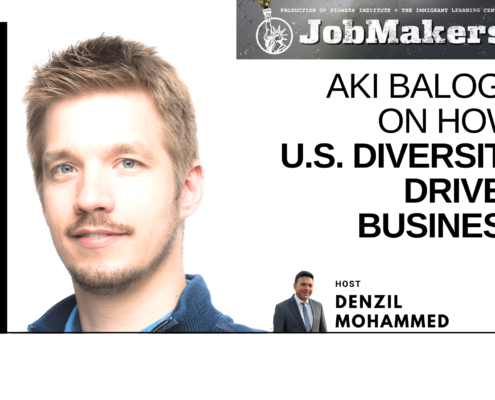
Aki Balogh on How U.S. Diversity Drives Business
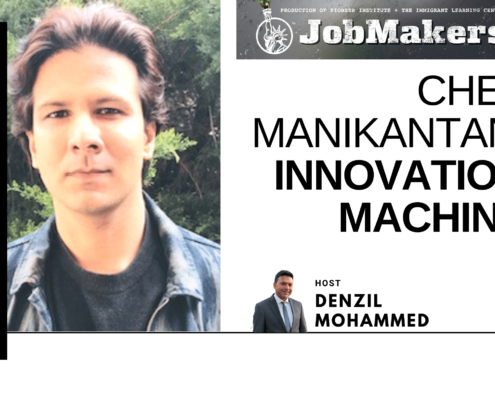
Chet Manikantan: Innovation Machine
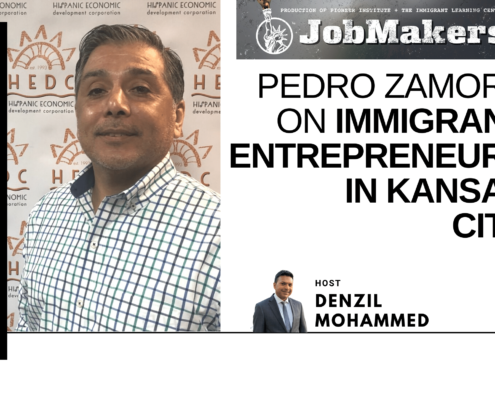
Pedro Zamora on Immigrant Entrepreneurs in Kansas City
